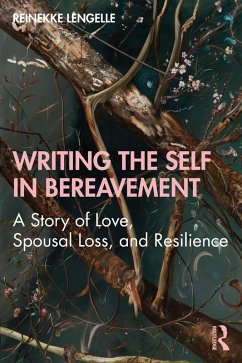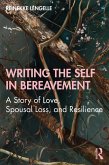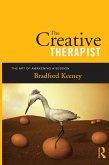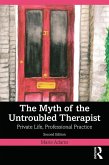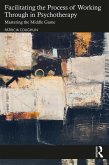Dieser Download kann aus rechtlichen Gründen nur mit Rechnungsadresse in A, B, BG, CY, CZ, D, DK, EW, E, FIN, F, GR, HR, H, IRL, I, LT, L, LR, M, NL, PL, P, R, S, SLO, SK ausgeliefert werden.
"In this highly original autoethnographic work, Reinekke Lengelle writes not only about her deceased love but continues to dialogue with him. As a "vulnerable researcher" she explores the depths of her own mind where her lost lover is recreated as a living figure in a poetic composition where truth and beauty meet." -Professor Emeritus Dr. Hubert Hermans, creator of Dialogical Self Theory
"Diving into death is both call and response to words and to witness. This book, with its crystal-clarity, bids readers to lean in, to listen. To accept the call to be unafraid. To stand in direct gaze with the tepid, terrifying, and tumultuous days of living with loss, longing, and love's relentless, vivid invitation to survive. And to thrive." -Margot Van Sluytman, Poet, BA, MA, Executive Director, Theodore's Place Healing Home for Crime Survivors
"Reinekke Lengelle writes: "I hope in writing this grief journey, awakenings are inspired that ripple out and offer comfort to others". This was certainly true for me. This book is not only for those bereaved by death, but also for those, like me, who are bereaved of parts of a wider relationship as age or illness takes its toll. An honest and powerful story of a journey towards the end of a life and relationship." -Kim Etherington, Professor Emerita of Narrative and Life Story Research, University of Bristol, UK. Author of 'Becoming a reflexive researcher: using ourselves in research'; 'Narrative approaches to working with adult male survivors of childhood sexual abuse' ; 'Trauma, the body and transformation' and other work.
"Part tribute, part love story, part memoir, part investigation into our most nascent drive to confront death on its own terms, Reinekke Lengelle's Writing the Self in Bereavement: A story of love, spousal loss and resilience is an unflinching account of her husband's determination to die as he lived, with humor and dignity. A frank and moving portrait of one woman's journey through grief and through the power of personal writing that is both poetic and therapeutic, Lengelle's narrative includes the turbulent, sometimes angry, sometimes affectionate emotions tied to grief. This book will appeal to scholars and to laypeople alike; but moreover, it will appeal to any reader who has experienced the death of a loved one, which, one way or another, touches all of us." -Judith Harris Ph.D, Author of Signifying Pain: Constructing the Self Through Writing and books of poetry: Atonement, The Bad Secret, and Night Garden. Her poems have appeared in The Atlantic, New Republic, Nation, Slate and the New York Times blog
"Reinekke's brave honest enquiry will support and inspire the bereaved, those who anticipate loss, and those who work with them. She tells herself 'don't miss it. Use all that fate gives you to to deepen your connection with yourself and life.' She demonstrates and illustrates how fate cracked, chipped or even seem to break her, but writing illuminated and healed with a seam of gold." -Dr Gillie Bolton, author of The Writer's Key: Creative Solutions for Life
"Writing the self in bereavement is a deeply useful book: helpful in its honesty, its companionship for those who are bereaved, and leads by being inspirational in the field of grief-writing. It is also a story of real love, to which many people will relate. It is rhythmic, accessible, theoretically and socially aware, and sensitive to the risks of representing life as it is experienced. We all have something to learn from Reinekke Lengelle's work." -Claire Williamson, Author of Visiting the Minotaur, and Programme Leader for Master of Science in Creative writing for Therapeutic Purposes, UK
"In this remarkable description of the first year of widowhood, Reinekke Lengelle displays courage and vulnerability as she uses expressive writing to process her grief. She locates her own experience in the academic literature on bereavement and early on identifies resilience as a key factor in her being able to continue to 'live forward' whilst acknowledging the enormity of her loss.
The early part of the book includes verbatim journal entries, personal poems, dialogues between her and her late husband, and an examination of unfinished business between them. There are unflinching and moving accounts of the pain of grief, the process of watching a loved one die, sexual desire in bereavement and the delicacy of a developing new relationship.
Later, there is a sense of gaining new perspectives and a need to look more questioningly at sensitive issues and the gains as well as challenges that come with loss. She draws on her own academic work on the Dialogical Self to theorise how writing accompanied and strengthened her resilience during these challenges in a year of profound changes.
Her determination to keep writing through her grief, as well as fulfilling the demands of work, family life and a wide network of friends, provides the reader with the gift of witnessing the power of expressive writing in action. Her perspective as a theorist and teacher of writing for healing creates a reflective and reflexive space where the raw data of her journal entries and poems are held up to the light and interrogated for meaning.
She also includes many allusions to her correspondence with other writers on grief, including autoethnographer, Carolyn Ellis with whom she shares a parallel story. In later chapters, she discusses what it means to put sensitive material into the public domain, and the process of deciding what is appropriate to share and what is rightly personal.
Expressive writing can facilitate much-needed sense-making during grief and mourning. In Western culture where mourning is often secular and individual, personal writing can provide solace, wisdom and resolution as Reinekke demonstrates. This book will be a useful road-map for those interested in using these techniques personally or facilitating their use with others.
Writing the Self in Bereavement is Reinekke's homage to her late husband and their relationship, two academics who were work partners as well as spouses. She shares how he respected her poetic soul but also urged her to write an academic book. Reinekke 'channels' the voice of Frans in her writing and his presence permeates this brave and unusual book. It is a true testimony to their time together." -Victoria Field, Writer, Researcher and Poetry Therapist

